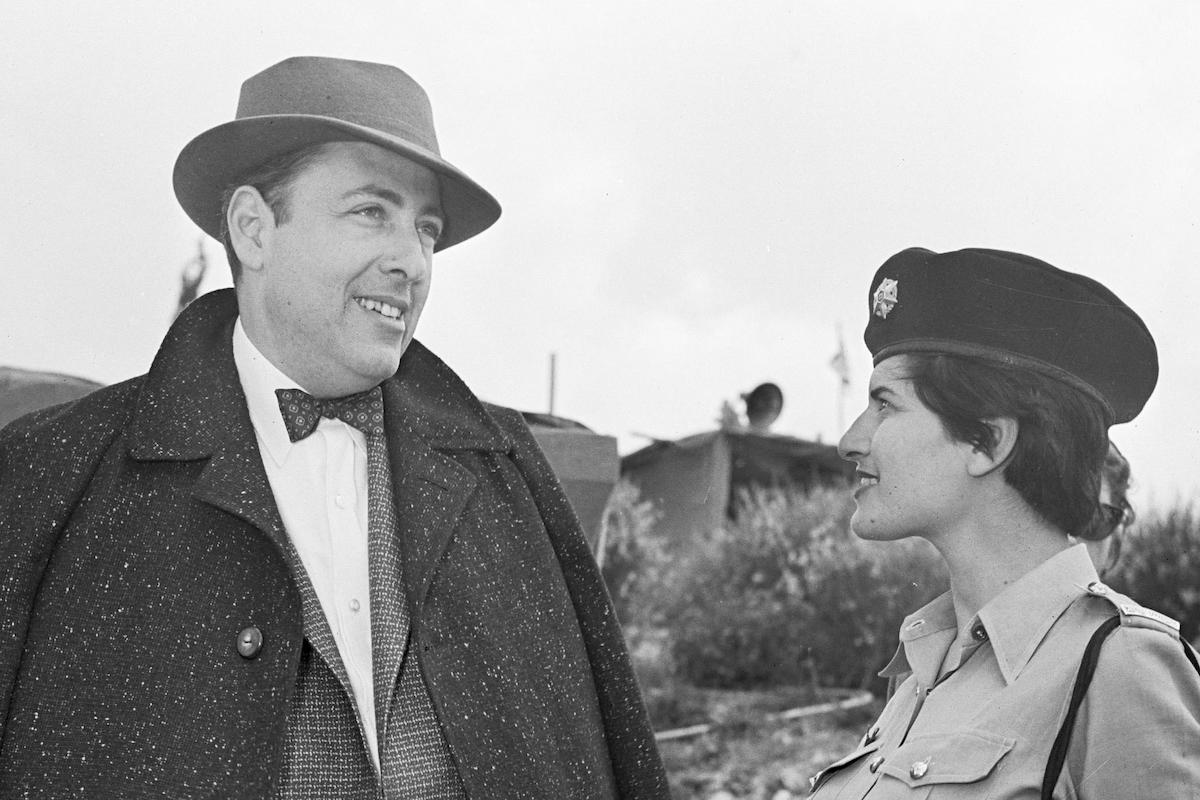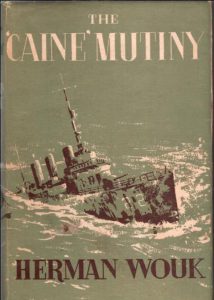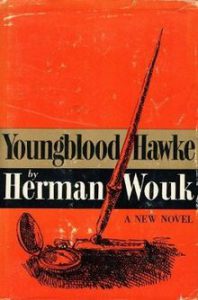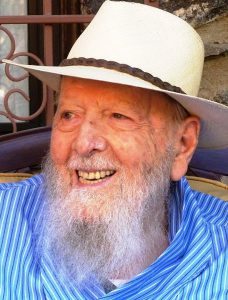Books
Goodbye, Herman Wouk

On May 17th, American novelist Herman Wouk died, just ten days before he was due to turn 104. If Ernest Hemingway’s life and career had been as long as those of Herman Wouk, he’d have been alive as recently as 2003 and he’d have published a book in 1999. Had John Steinbeck lived and worked as long as Wouk, he’d have seen the re-election of George W. Bush and have published a book around the same time as Jonathan Franzen’s The Corrections. Had Charles Dickens lived as long as Wouk, he’d have witnessed the arrival of World War I. Had Arthur Conan Doyle lived as long, he might’ve heard the Beatles first single, “Love Me Do,” on the radio in his final days. Rudyard Kipling would have been able to purchase a copy of Sergeant Pepper’s Lonely Hearts Club Band.
Wouk not only outlived all of his Lost Generation heroes (notably Thomas Wolfe and Hemingway), but also all of his literary contemporaries of the Greatest Generation (Malmud, Welty, Salinger, Bellow, Mailer, Cheever, Vonnegut, Vidal, Heller). What’s more, he outlived most of the best writers of the Silent Generation (Updike, Roth, Ken Kesey), numerous baby boomer writers (Laurie Colwin, Sam Shepard, David Foster Wallace), and even some Gen X authors (Samuel Park) and Millennials (Marina Keegen). No author as important and productive as Herman Wouk has ever lived as long as he did.
The son of Russian Jewish immigrants, Herman Wouk grew up in New York City between the world wars. He fought with distinction in history’s greatest manmade cataclysm and lived to write about it better than almost anyone else who ever tackled the subject. In the 1960s he managed a hotel in the U.S. Virgin Islands. He lived in Mexico for a while and lost a young son there in a drowning accident. He lived in Washington, D.C., while researching the two big War novels. He also spent a large part of his life in California.

The Caine Mutiny (1951) was one of the seminal novels of the 1950s. It kicked off a vogue for serious, literary courtroom dramas and helped pave the way for later titles such as James Gould Cozzens’s By Love Possessed, Robert Traver’s Anatomy of a Murder, Meyer Levin’s Compulsion, and even Harper Lee’s To Kill A Mockingbird. Jack Kerouac also wrote one of the seminal novels of the 1950s, but he has been dead and gone for 50 years despite having been born seven years after Wouk. Marjorie Morningstar, a tale about the perils of young womanhood in America, was the bestselling novel of 1955 and has never gone out of print. Grace Metalious, whose Peyton Place, a bestselling novel about the perils of young womanhood in America, was published the following year, was born nearly a decade after Wouk and has been dead for more than 55 years.
Although he was never a favorite of highbrow critics, Wouk was admired by legions of readers from both the Greatest Generation and the Silent Generation. But his biggest impact was probably on members of my own generation, the Baby Boomers—though perhaps not every segment of the Boomer population. I’ve noticed that older Boomers—those born in the late 1940s, and thus old enough to have been true hippies in the 1960s—tend to prefer the works of Kerouac, Burroughs, and their Beat contemporaries. To the kids who were on campuses in the late 1960s, Wouk was considered a square oldster, a member of their fathers’ generation who wrote favorably about the U.S. military. Born in 1958, I was too young to have been a campus protestor in the 1960s. In the late 1970s and early 1980s, when I was a young adult, older Boomers were always trying to turn me on to the works of Vonnegut, Brautigan, and Kerouac. And it worked. I enjoyed the works of those writers. But whenever I tried to encourage them to read Wouk, they’d smile wanly as if I just didn’t get it. Wouk was an establishment figure, and a has-been to boot. But among my cohort of Boomers, the mini-generation born between 1954 and 1965 and sometimes referred to as Generation Jones, I have found plenty of fellow Woukians.
Four years ago, on the occasion of Wouk’s one hundredth birthday, David Frum (born in 1960) published a moving (and not entirely uncritical) essay about Wouk and his work in the Atlantic. For Frum, Wouk’s most important work is the two-volume saga of World War II comprising The Winds of War (1971) and War and Remembrance (1978). In 2017, the novelist Ann Hood (born 1956) published a memoir of her early life as a reader. Her book is called Morningstar in honor of Wouk’s Marjorie Morningstar, a novel she claims to have re-read nearly every year since 1972.
The War novels were my introduction to Wouk. I read them both in the late 1970s, in paperback editions that were nearly as thick as they were tall. They brought World War II to life for me in a way that no previous book, movie, or TV show ever had. Later I read The Caine Mutiny and it achieved something I would have thought impossible: it brilliantly depicted the tedium of life aboard a naval vessel without ever being tedious itself. Like Ann Hood, I love Marjorie Morningstar and its vivid descriptions of upper-crust Jewish family life in the New York of the 1930s and 40s, Hunter College intellectual circles, Jewish summer camps, and the world of professional theater people. I had absolutely no first-hand experience of any of these things, but I felt like an expert once I’d finished the book.

Still, my favorite of Wouk’s many books remains Youngblood Hawke (1962), the tale of a young southern writer whose short turbulent career was based in part on the life of Thomas Wolfe (with a lot of Wouk’s own life and career mixed in). I read it in the mid-1980s when I, like Hawke, was a struggling young writer (as opposed to the struggling old writer I am now). It became almost a bible to me in the way that Marjorie Morningstar became a bible to Hood. I can’t claim to have read it every year since 1986, but I have read it about once a decade since then. If you check out the book’s reader reviews at Goodreads or Amazon.com or any similar website, you’ll find a lot of others who first read the book back in the 1970s and 1980s and then decided they wanted to be writers. Wouk may be responsible for more failed writing careers than the entire Lost Generation.
I can’t claim that Wouk was without faults. For one thing, his writing was often extremely politically incorrect. His work was a product of its time, full of “Chinamen” and “Negresses” and various other words and stereotypes now considered offensive. Even worse may be Wouk’s “lookism.” Any time a character is described as bald or short or ugly, they almost always turn out to be weak, cowardly, deceitful, or worse. The biggest sin in Woukworld is to be fat. The adjective appears over and over again in his books. Marjorie Morningstar’s friend Marsha Zelenko is referred to dozens of times as “the fat girl.” Marsha, unsurprisingly turns out to be a mooch, a slob, and a bit untrustworthy. The adjective “fat” must appear close to 100 times in Youngblood Hawke, and its recipients are rarely portrayed positively. Worse still was Wouk’s homophobia. Whenever a male character is portrayed as effeminate by Wouk, it is a mistake to turn your back on him.
Still, Wouk got a lot more right than he got wrong. He wasn’t a historical novelist per se. He wrote primarily about the eras he lived through (and he lived through plenty of them). That’s why when the characters in The Caine Mutiny visit San Francisco on shore leave, you can almost taste the smoky air of the various dive bars they visit. I love the way Youngblood Hawke brings to life venues of which I have never myself been a part: the New York publishing industry, Manhattan cocktail parties, a hardscrabble Kentucky boyhood in the 1930s, and Hollywood parties where an obnoxious guest is likely to get thrown into a swimming pool before the night is over (especially, alas, if he is gay).
Asked in 2012 by Vanity Fair to name the living person he hates most, Wouk answered, “The Jewish writer who traduces his Jewishness.” Norman Mailer was five years dead by then, so Wouk may not have had him in mind, but whenever Wouk traduced one of his competitors it’s usually safe to imagine that he was talking about Mailer. Wouk’s novel City Boy was published in 1948 to poor sales and reviews. Most of the literary oxygen that year was taken up by Norman Mailer’s profanity-laced The Naked and the Dead. In Youngblood Hawke, Wouk’s protagonist publishes a first novel in 1947 called Alms for Oblivion and then spends much of the next year complaining about “the sensational new war novel full of dirty words” that has cast shade on his own effort. Youngblood Hawke was published 14 years after the City Boy/The Naked and the Dead clash, but the wound still seems to have been fresh for Wouk.

Sadly, it appears that Generation Jones may be the last to include large numbers of Wouk enthusiasts. I work in a bookstore and I rarely sell a Wouk title to anyone younger than I am. I’m loath to recommend them to Millennial shoppers because the books are massive and each of them is littered with the kind of politically incorrect language and attitudes that make a progressive’s head explode. So, I don’t tend to recommend the books to readers under 40. Which is a shame, really. Although he spent more years than most as an old man, Wouk’s books are full of fascinating young characters, which is why their titles contain so many names and words and phrases that suggest youthful aspiration: City Boy, Aurora Dawn, Morningstar, Youngblood, Don’t Stop the Carnival, Hope, Glory, and so on.
America has produced more popular novelists and more serious novelists, but few popular novelists have ever possessed Wouk’s literary chops and few literary novelists have possessed his common touch. To call Wouk the greatest American middle-brow novelist of all time can be construed as faint praise only by those who are too snobbish to appreciate the delights to be found in the works of such authors as Edna Ferber, Sinclair Lewis, Margaret Mitchell, John P. Marquand, Harper Lee, John O’Hara, A.B. Guthrie, Larry McMurtry, and many others like them. Herman Wouk may not have been a great writer, but he was a greatly entertaining one, and he led a rich, fascinating life. He not only lived long, he lived large.





